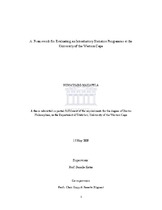A framework for evaluating an introductory statistics programme at the University of the Western Cape
Abstract
There have been calls both from the government and private sector for Higher Education institutions to introduce programmes that produce employable graduates whilst at the same time contributing to the growing economy of the country by addressing the skills shortage. Transformation and intervention committees have since been introduced to follow the extent to which the challenges are being addressed (DOE, 1996; 1997; Luescher and Symes, 2003; Forbes, 2007). Amongst the list of issues that needed urgent address were the skills shortage and underperformance of students particularly university entering students (Daniels, 2007; De Klerk, 2006; Cooper, 2001). Research particularly in the South African context, has revealed that contributing to the underperformance of university entering students and shortage of skills are: the legacy of apartheid (forcing certain racial groups to focus on selected areas such as teaching and nursing), the schooling system (resulting in university entering students to struggle), the home language and academic language. Barrell (1998), places stress on language as a contributing factor towards the performance of students. Although not much research has been done on skills shortage, most of the areas with skills shortage require Mathematics, either on a minimum or comprehensive scale. Students who have a strong Mathematics background have proved to perform better compared to students who have a limited or no Mathematics background at all in Grade 12 (Hahn, 1988; Conners, McCown & Roskos-Ewoldsen, 1998; Nolan, 2002).The department of Statistics offers an Introductory Statistics (IS) course at first year level. Resources available to enhance student learning include: a problem-solving component with web-based tutorials and students attending lectures three hours per week. The course material and all the necessary information regarding the course including teach yourself problems, useful web-sites and links students can make use of, are all stored under the Knowledge- Environment for Web-based learning (KEWL). Despite all the available information, the students were not performing well and they were not interested in the course. The department regards statistical numeracy as a life skill. The desire of the department is to break down the fear of Statistics and to bring about a perspective change in students' mindsets. The study was part of a contribution to ensuring that the department has the best first year students in Statistics in the Western Cape achieving a success rate comparable to the national norm.

